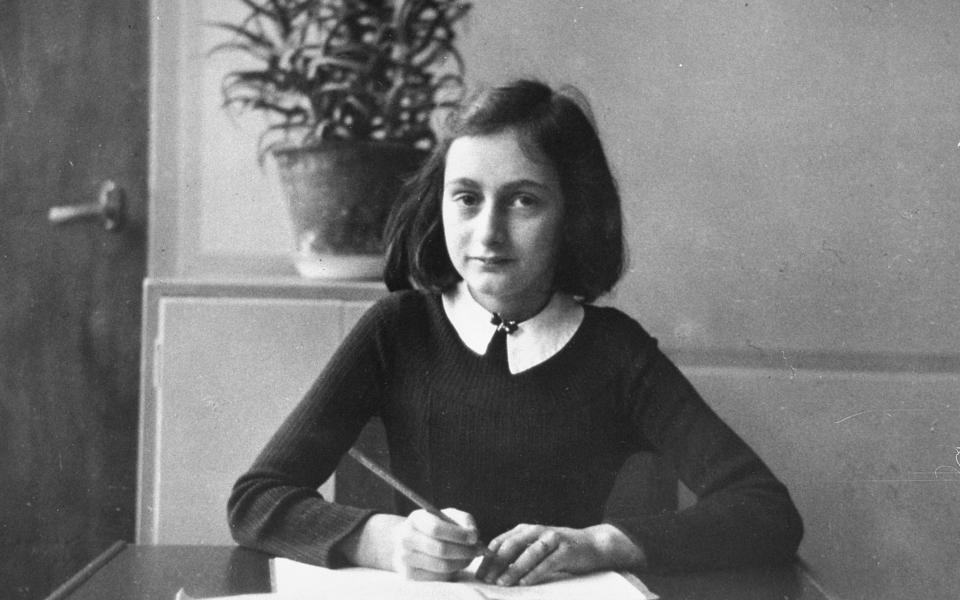We are living through extraordinary times, is it worth keeping a diary?

"I am just going to write because I can’t help it,” wrote Charlotte Brontë, in the diary that she kept of her life as a school teacher at Roe Head School. She charted her daily life, in pages of repression, longing and creative fury, which she would later put in her books. Diaries can be powerful and dangerous. And we are greatly fortunate that our ancestors kept them, did not burn them, and we can still hear their voices; angry, passionate, faulty, compassionate, committing wrong and being sinned against.
When Anne Frank’s family were arrested by the Gestapo in their ‘Secret Annex’ in Amsterdam, Miep Gies, the woman who had been caring for them, found sheafs of paper in Anne’s handwriting on the floor. She bundled them up and when Otto Frank, the only survivor of his family, contacted her after the war, she gave them to him. The diary is, perhaps, the most famous in the world, the symbol of horrific suffering and Anne’s bravery, the crushing fear of living hidden as “Jews in chains”.

Miep never read the papers; she later wrote “Had I read it,” she said afterwards, “I would have had to burn the diary because it would have been too dangerous for people about whom Anne had written.” How fortunate we are that she did not.
But what of diaries now? Shops are still full of them, but very few of us write one; no shop keeps a handwritten ledger, no housekeeper a receipt book. We often hear we are living through unprecedented times. Historians of the future will want to know how ordinary people survived: losing family members, living day to day with the coronavirus amid a workplace revolution, schools crisis and ever-changing restrictions on their daily movements.
Many of us confide thoughts to Twitter, Instagram or Facebook, but often we delete or don’t post our most personal. We know that history is written by the victors, and that many voices of the past were silenced because of their race, sex, status, religion or class. But still, there were some written documents to survive. Can our digital ‘footprint’ be the same?
As a historian, I love diaries and I spent most of my life looking for the sources and documents that will shed light on the past, and the people who lived in it, digging through the archives. As the author of a preface to Great Diaries, an illustrated book which showcases great diaries of the last 4500 years, handwritten accounts of life from the age of the pharaohs to the modern day, I was entranced by the range, particularly of those by great creators and ordinary people.
I was struck by the diary of Elizabeth Drinker, Quaker housewife who wrote about life during the American Revolution. Her writings record her thoughts about the war, persecution of Quakers and her children’s illnesses; family life in the midst of great events.
Carolina Maria de Jesus wrote powerfully in the 1950s about daily life in the São Paulo favela: hunger, poverty and discrimination. “Whoever is born and can put up with this life until death must be…a hero,” she wrote. Michihiko Hachiya recounted his life as a doctor in Hiroshima after the bomb dropped in 1945, recording how he had been sleeping when woken by a “strong flash of light” and realised his house was falling and how when he ventured out, “the city was like a desert”.
Murasaki Shikibu, author of probably the world’s first novel, Tale of Genji, was lady-in-waiting to the Imperial Empress in early eleventh-century Kyoto, but her diary brings to life the day-to-day world of the Heian Court. It is both a brilliant insight into a secret, long-gone world and full of emotion: Lady Murasaki recounts the careful behaviours of court, her loneliness and grief for her husband and also is amusingly scathing of some at court, including the Empress’s father.
Some diaries are revelations of creative brilliance. Leonardo da Vinci left 6000 pages of notebooks, detailing his astonishing discoveries in everything from physics to anatomy, and drawings of incredible beauty and skill, such as his design for the first flying machine. Frida Kahlo’s diary bursts with colour and images, an incredible record of creative exploration. She experienced severe chronic pain after a bus crash in her youth, but she writes of how her mind soars, even after one foot had been amputated: “Feet, what do I need them for when I have wings to fly.”
Some of the diaries are joyous, some document suffering, others are the diaries of those who imposed suffering on others as conquerors and enslavers. Others are heartbreaking, with hindsight. Marie Curie’s journals recount her efforts to investigate radiation, working in a converted shed without protective clothing, which exposed her to huge doses. Her diaries now are the most dangerous of all due to radioactivity: they are stored in lead-lined boxes and still, over a hundred years since she composed them, considered too dangerous to read without protection.
Reading Vincent Van Gogh’s words in his diary-like letters to his brother, Theo, make us wish he could see a modern day art auction, as he worried over his poverty and obscurity: “the hardship of producing paintings will have taken my entire life and it will seem to me that I haven’t lived.”
Two of the most powerful diaries I have ever read came from enslaved people – Olaudah Equiano and Michael Shiner. Equiano was kidnapped in his village of Benin, enslaved and traded, but then bought his freedom and made his way in Georgian London, marrying, becoming part of society, and fighting for the abolition of slavery.
Shiner, initially a slave in Washington DC, kept a record of his views for almost 60 years from 1813, including the sale of his family to another owner, and his emancipation. To read these narratives, from different continents and decades apart, is to begin to understand the impact of the slave trade.

What is the most striking about reading a diary are the everyday details – how they reveal more about great moments, and how the things we might take for granted turn into great revelations, years on. In 2013, a diary on papyrus was discovered in Egypt of Merer, an Egyptian civil servant working in 2562 BCE on the Great Pyramid of Giza.
He oversaw the transport of limestone blocks for the pyramid from the quarry along the Nile and canals to the construction site. What might have been seen by other men at the time as work so familiar that it needed little description is, to us, an incredible insight into the building of one of the Seven Wonders of the World.
The diary of an ordinary woman or man during 2020 will be gold dust: but is anyone keeping it? “Sat at the computer checking spreadsheet while attempting to supervise child’s home school on fractions. Then Zoom-called shielding parents whom we cannot see,” might not seem very unique to us, as hundreds of thousands across the world are doing the same.
But like Merer organising the shipping of blocks to build the pyramid, it will be fascinating to the future. I hope that some of those on the front line against Covid – doctors, nurses, care workers and key workers such as delivery drivers or bus drivers – might have found a few moments to keep notes.
“I want to go on living after my death,” wrote Anne Frank in 1944, not long before she and her family were seized. Diaries are a great treasure; I hope they will continue forever.
Great Diaries, with a foreword by Kate Williams, by Dorling Kindersley, (RRP £20). Buy now for £16.99 at books.telegraph.co.uk or call 0844 871 1514 https://books.telegraph.co.uk/Product/DK/Great-Diaries--The-worlds-most-remarkable-diaries-journal/24393543

